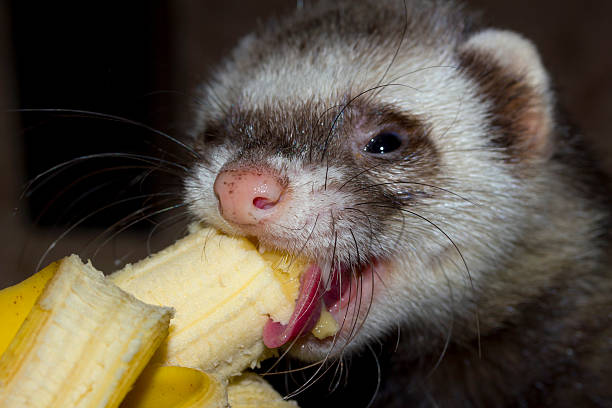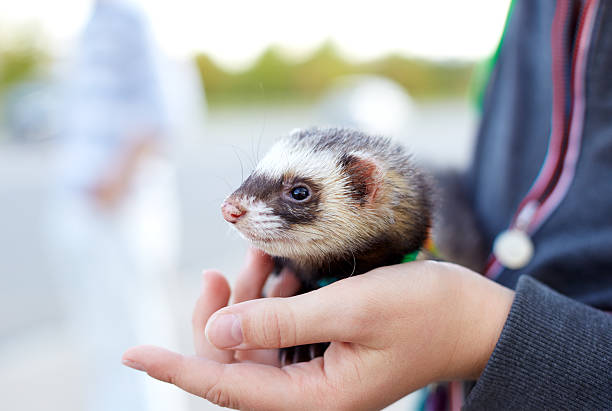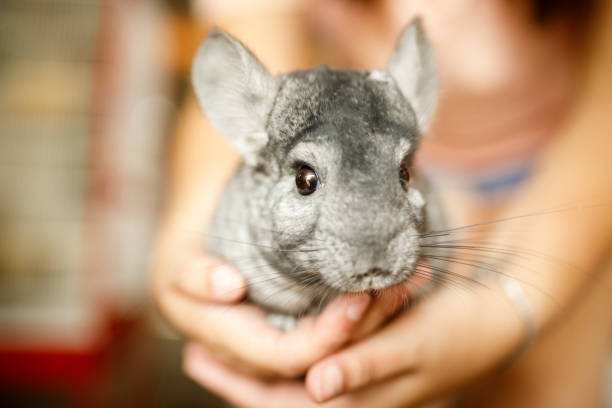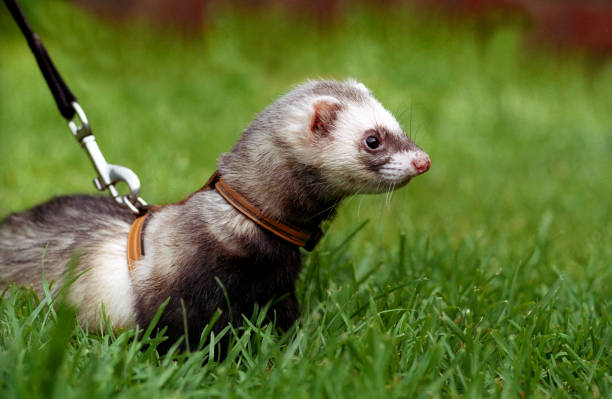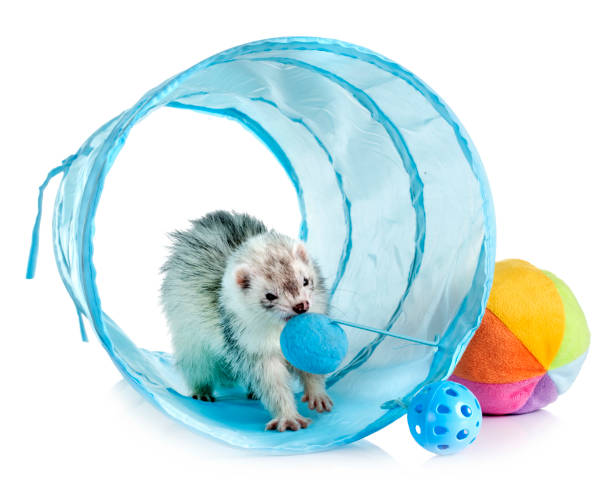Ferret Diets: Navigating Nutritional Needs for a Vibrant Life
This post contains affiliate links. This means I will make a commission at no extra cost to you should you click through and make a purchase. Read the full disclosure here.
Ferrets, those playful and spirited companions, captivate us with their boundless energy and inquisitive nature. As devoted ferret owners, we understand the importance of providing the best care for our furry friends, and at the heart of their well-being lies one essential factor: their diet. Welcome to our comprehensive guide on Ferret Diets, where we embark on a journey to uncover the intricacies of what makes up a nourishing and balanced diet for these charming creatures.
Just as we tailor our diets to support our health, ferrets have unique dietary needs that are essential to their vitality and overall wellness. Unlike some pets, ferrets are obligate carnivores, meaning their bodies are designed to thrive on animal-based proteins and fats. This distinct dietary requirement stems from their evolutionary history as hunters and carnivores in the wild.
Throughout this guide, we will delve into the components that constitute a ferret’s diet, exploring the significance of high-quality proteins, the role of fats, and the importance of essential nutrients like taurine. We’ll navigate the choices between commercial ferret foods and homemade diets, providing you with the insights needed to make informed decisions that prioritize your ferret’s health.
The Carnivorous Nature of Ferrets
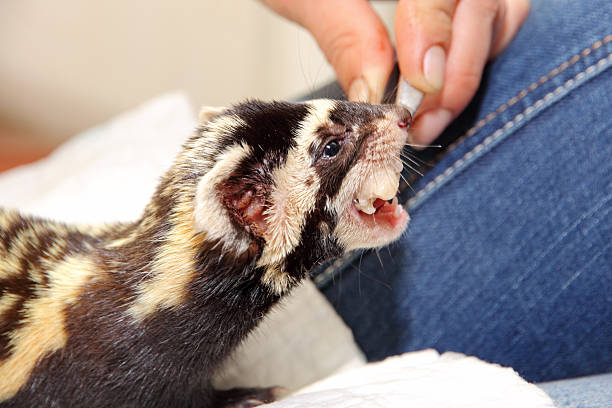
Understanding the Obligate Carnivore Diet
To truly comprehend the dietary needs of ferrets, it’s crucial to grasp their status as obligate carnivores. This term isn’t just a label; it signifies a fundamental aspect of their biology and physiology. Unlike omnivores that can derive nutrition from a variety of sources, ferrets have evolved to thrive solely on a diet composed of animal-based proteins and fats.
High-Protein, Low-Carb Lifestyle:
- Ferrets are equipped with a digestive system that excels at processing animal proteins.
- Their short digestive tract emphasizes the rapid breakdown and absorption of proteins.
- Unlike herbivores or even omnivores, ferrets lack the necessary enzymes to effectively digest carbohydrates.
The Role of Taurine:
- Taurine is an amino acid essential for many physiological functions.
- Ferrets cannot synthesize sufficient taurine on their own and require it in their diet.
- A lack of taurine can lead to severe health issues, particularly affecting the heart and eyes.
Unique Digestive System:
- Ferrets possess a simple stomach, characteristic of carnivores, which aids in quickly digesting proteins.
- Their lack of a cecum, responsible for breaking down plant matter, further emphasizes their carnivorous nature.
Essential Nutrients:
- In addition to taurine, ferrets require other vital nutrients like arachidonic acid and specific vitamins.
- These nutrients support various bodily functions, from maintaining healthy skin to promoting a strong immune system.
Understanding the obligate carnivore status of ferrets underscores the importance of providing a diet that aligns with their natural physiological processes. In the upcoming sections, we’ll delve deeper into the specific components of a ferret’s diet, shedding light on how to craft a nourishing and balanced meal plan for your furry companion.
The Essential Components of a Ferret Diet

Building Blocks for Optimal Health and Vitality
Crafting a well-rounded and nutritious diet for your ferret requires a keen understanding of the essential components that contribute to their overall health and vitality. Let’s explore the key elements that make up a ferret’s diet:
1. Protein Powerhouse:
- Ferrets thrive on a diet rich in animal-based proteins.
- Look for commercial ferret foods with meat as the primary ingredient.
- Poultry, fish, and other lean sources of protein are excellent choices.
2. Embracing Healthy Fats:
- Fats are a significant energy source for ferrets.
- Opt for foods with moderate fat content to maintain a healthy weight.
- Avoid excessive fat consumption, which can lead to obesity.
3. Taurine: The Heart Protector:
- Taurine is essential for ferrets’ heart and eye health.
- Ensure that your ferret’s diet includes an adequate amount of taurine.
- Consult with a veterinarian to determine taurine requirements based on your ferret’s needs.
4. Balancing Vitamins and Minerals:
- High-quality ferret foods should provide a balanced array of vitamins and minerals.
- Avoid over-supplementing, as excessive amounts of certain nutrients can be harmful.
- A varied diet helps ensure a comprehensive intake of essential nutrients.
5. Avoiding Plant Matter:
- Ferrets have limited ability to digest plant matter due to their short digestive tract.
- Avoid foods with excessive carbohydrates, fiber, or plant-based ingredients.
- Prioritize animal-based proteins and fats to cater to their natural dietary requirements.
By focusing on these essential components, you’re laying the foundation for a diet that supports your ferret’s growth, energy levels, and overall well-being. In the following sections, we’ll explore the options of commercial and homemade diets, guiding you toward the best choices for your ferret’s dietary needs.
Commercial vs. Homemade Diets: Making Informed Choices
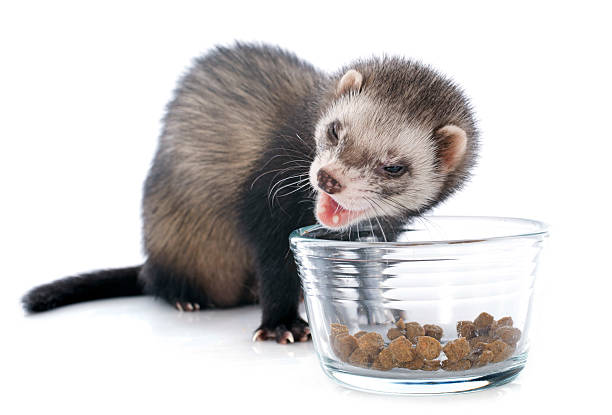
Weighing the Pros and Cons
When it comes to nourishing your ferret, you’re faced with the decision between commercial ferret foods and homemade diets. Both options have their merits, but understanding the advantages and potential drawbacks is crucial for making an informed choice:
Commercial Ferret Foods:
- Convenience: Commercial ferret foods are readily available and save you time in meal preparation.
- Balanced Nutrition: High-quality commercial foods are formulated to meet ferrets’ specific dietary needs.
- Variety: There’s a range of commercial options catering to different stages of life and health requirements.
- Proper Taurine Content: Reputable brands ensure proper taurine levels, reducing the risk of deficiency.
Homemade Diets:
- Customization: Preparing meals at home allows you to control the ingredients and tailor the diet.
- Natural Ingredients: You can choose high-quality, fresh ingredients for your ferret’s meals.
- Potential for Bonding: Preparing meals can strengthen the bond between you and your ferret.
- Supervision of Ingredients: You have direct control over the sourcing and quality of the food.
Considerations for Homemade Diets:
- Nutritional Balance: Formulating a balanced homemade diet requires careful planning and research.
- Potential Deficiencies: Inadequate nutrient content can lead to health issues, especially if not properly supplemented.
- Time and Effort: Preparing homemade meals demands time and effort, including sourcing and meal preparation.
- Consultation with Veterinarian: Consulting a veterinarian or animal nutritionist is essential to ensure your homemade diet meets all nutritional requirements.
Finding the Middle Ground:
- Combining Both: Some ferret owners opt for a combination of commercial food and occasional homemade meals.
- Balance and Variety: This approach offers the benefits of balanced nutrition and the opportunity to provide fresh, varied ingredients.
Ultimately, whether you choose commercial ferret foods or homemade diets, the well-being of your ferret is the top priority. Regardless of your choice, remember to prioritize the essential components of a ferret’s diet—protein, fats, taurine, and vital nutrients. In the following section, we’ll delve into feeding guidelines and schedules that align with your ferret’s unique metabolism.
Feeding Guidelines and Schedule: Catering to Ferret Metabolism
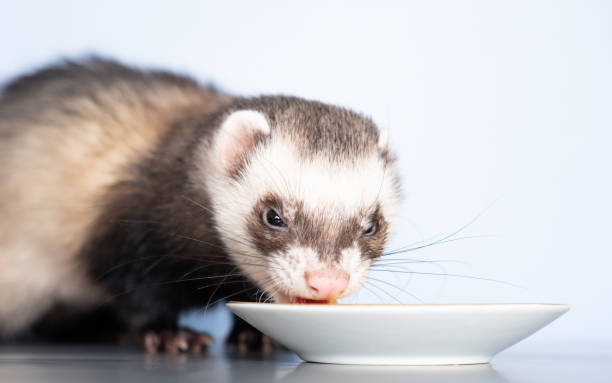
Navigating Portion Control and Meal Timing
Feeding ferrets require a unique approach due to their high metabolism and specific dietary needs. Establishing a proper feeding schedule and portion control is key to ensuring your ferret receives the necessary nutrition without risking overfeeding or obesity. Here’s how to navigate feeding guidelines for your energetic companions:
1. Portion Control:
- Follow Package Recommendations: Most commercial ferret foods provide guidelines for portion sizes based on your ferret’s weight and age.
- Adjust as Needed: Monitor your ferret’s weight and adjust portion sizes accordingly to maintain a healthy body condition.
- Avoid Overfeeding: Overfeeding can lead to obesity, which increases the risk of health issues.
2. Frequency Matters:
- Frequent Small Meals: Ferrets have a rapid metabolism and require multiple small meals throughout the day.
- Daily Meal Frequency: Aim for 4 to 6 small meals daily, spaced out evenly to prevent long gaps between feedings.
- Consistent Schedule: Establishing a consistent feeding routine helps regulate your ferret’s metabolism.
3. Avoid Free-Feeding:
- Limit Grazing: Free-feeding, or leaving food out all day, can lead to overeating and weight gain.
- Structured Meals: Serve controlled portions at specific meal times to ensure your ferret’s nutritional needs are met.
4. Observing Your Ferret:
- Individual Needs: Pay attention to your ferret’s appetite and energy levels. Adjust portion sizes based on their activity level and metabolism.
- Weight Management: Regularly weigh your ferret to track any changes and make adjustments as necessary.
5. Hydration is Key:
- Access to Fresh Water: Provide clean, fresh water at all times. Dehydration can be a serious concern, so ensure their water bowl is always filled.
Remember, each ferret is unique, and their dietary needs may vary. Adjustments to portion sizes and feeding frequency may be required based on factors such as age, activity level, and health status. By adhering to these feeding guidelines and prioritizing your ferret’s nutritional needs, you’re ensuring they have the energy and vitality to enjoy life to the fullest. In the upcoming section, we’ll explore the world of treats and snacks, providing insights on maintaining a balanced indulgence for your ferret.
Treating Your Ferret: Healthy Indulgences and Snacking
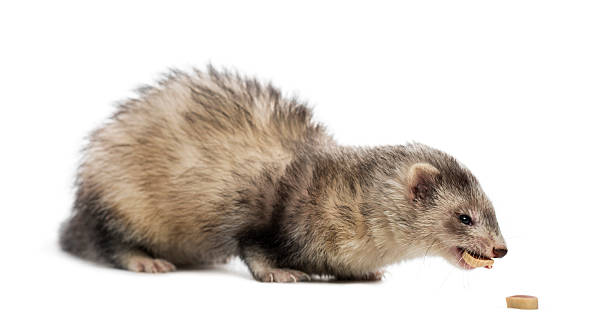
Balancing Treats with Nutritional Health
Treating your ferret to the occasional snack is a delightful way to show your affection and bond with your furry friend. However, it’s essential to strike a balance between indulgence and nutritional health. Let’s explore how to treat your ferret while ensuring its overall well-being:
1. Moderation is Key:
- Limited Treats: While treats can be enjoyable, they should constitute only a small portion of your ferret’s diet.
- Avoid Overindulgence: Excessive treats can lead to imbalances in their nutritional intake and potential health issues.
2. Opt for Protein-Rich Treats:
- Choose Wisely: Select treats that are primarily composed of animal-based proteins.
- Meaty Delights: Freeze-dried meat treats, such as chicken or turkey, are excellent options.
- Avoid Sugary Treats: Steer clear of sugary or starchy treats, which can contribute to health problems.
3. Rewarding with Care:
- Positive Reinforcement: Use treats as rewards for desired behaviors, reinforcing positive actions.
- Training Moments: Treats can be useful during training sessions, associating good behavior with a tasty reward.
4. Limit Human Foods:
- Resist Sharing: While it’s tempting to share human food, many items are unsuitable for ferrets.
- No Chocolate: Chocolate is toxic to ferrets and should never be offered.
5. Monitoring Your Ferret’s Weight:
- Observe Changes: Keep a close eye on your ferret’s weight and body condition.
- Adjust Treats: If you notice weight gain, consider reducing treat portions.
6. DIY Treats:
- Homemade Options: Explore homemade treat recipes using ferret-safe ingredients.
- Controlled Ingredients: Preparing treats at home gives you control over the ingredients and their nutritional value.
Remember that the joy of treating your ferret is in the shared moment and the positive interaction. By maintaining a balanced approach to treats, you’re ensuring that these special moments contribute to your ferret’s overall health and happiness.
Transitioning Diets and Special Considerations
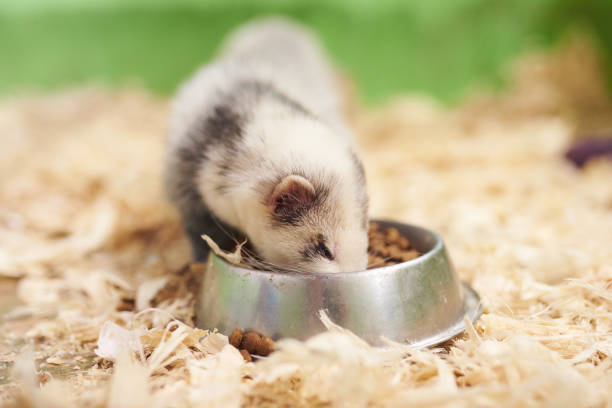
Adapting Nutrition for Different Stages and Health Needs
As responsible ferret owners, we must be prepared to adapt our ferrets’ diets to various life stages and health conditions. Whether transitioning from kits to adults or catering to the needs of ferrets with specific health concerns, understanding these transitions is vital for their well-being:
1. Transitioning Diets: Kits to Adults:
- Gradual Shift: When transitioning kits (young ferrets) to adult diets, make changes gradually over several weeks.
- Mixing Foods: Initially mix a small portion of the new food with their current diet, gradually increasing the proportion of the new food.
- Monitoring Health: Observe their behavior, stool quality, and weight during the transition.
2. Catering to Health Conditions:
- Insulinoma: Ferrets with insulinoma require a diet low in carbohydrates and high in protein. Consult your vet for specific dietary recommendations.
- Gastrointestinal Sensitivity: Some ferrets have sensitive stomachs. Opt for easily digestible foods and avoid sudden changes.
3. Veterinary Consultation:
- Individualized Guidance: If your ferret has specific health conditions, consult a veterinarian or animal nutritionist.
- Tailored Diet Plans: Professionals can provide personalized dietary recommendations to address your ferret’s unique needs.
4. Monitoring and Adjustments:
- Regular Check-Ins: Monitor your ferret’s health and behavior regularly to ensure their diet is suitable.
- Weight Management: Regularly weigh your ferret and make adjustments as needed to maintain a healthy weight.
5. Offering Variety:
- Balanced Diet: Incorporate a variety of high-quality foods to provide a well-rounded diet.
- Avoid Monotony: Rotating foods prevents your ferret from becoming bored with their diet and encourages a balanced nutrient intake.
Transitioning diets and catering to health considerations are important aspects of ferret care that directly impact their quality of life. By staying attentive, seeking professional advice when needed, and adjusting their diet as circumstances change, you’re providing the best care possible for your beloved ferret.
Hydration: Ensuring Optimal Water Intake
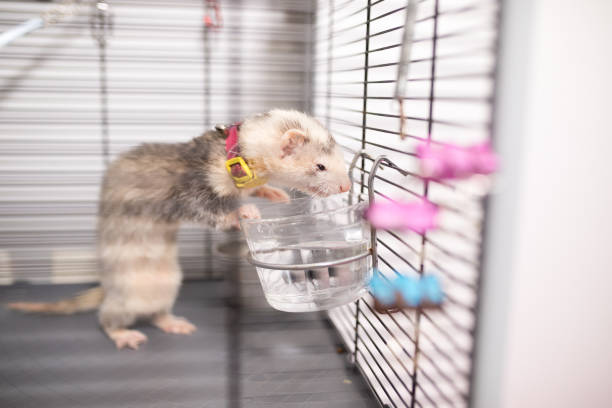
Quenching Thirst for a Healthy Ferret
While we often focus on food, ensuring your ferret stays properly hydrated is equally vital for their well-being. Hydration plays a crucial role in maintaining overall health, supporting bodily functions, and preventing dehydration-related issues. Here’s how to keep your ferret well-hydrated:
1. Providing Fresh Water:
- Accessible Water Source: Always have a clean water bowl available for your ferret.
- Regular Refills: Check and refill the water bowl multiple times a day to ensure a continuous supply of fresh water.
2. Monitoring Water Intake:
- Observing Habits: Keep an eye on your ferret’s water consumption. Changes can indicate health concerns.
- Increased Water Intake: Excessive drinking or sudden changes may warrant a veterinary consultation.
3. Preventing Dehydration:
- Understanding Signs: Familiarize yourself with signs of dehydration, including lethargy, sunken eyes, and dry gums.
- Immediate Action: If you suspect dehydration, encourage your ferret to drink and seek veterinary attention.
4. Factors Affecting Hydration:
- Activity Level: More active ferrets may need increased water intake.
- Climate: Hot weather and dry environments can lead to higher water needs.
5. Incorporating Moist Foods:
- Wet Food Options: Including wet foods in your ferret’s diet can contribute to their hydration.
- Consult with Vet: Consult a veterinarian about wet food options and how they fit into your ferret’s diet.
Remember that dehydration can have serious consequences for your ferret’s health. By consistently offering fresh water, monitoring their water intake, and being attentive to signs of dehydration, you’re ensuring that your ferret remains properly hydrated and healthy.
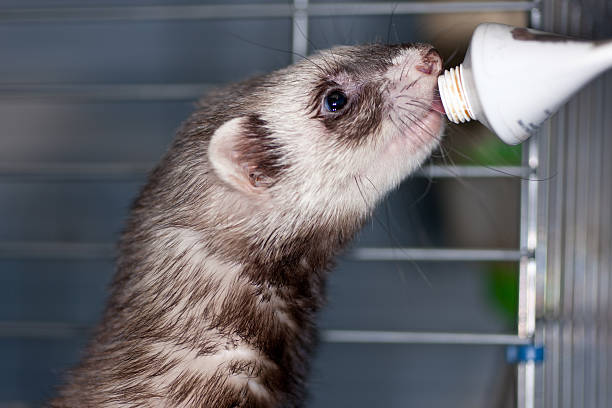
Final Thoughts
From commercial ferret foods to homemade diets, from portion control to hydration, each aspect of your ferret’s dietary care contributes to their well-being. By maintaining an awareness of their individual needs, considering life stage transitions and health conditions, and staying attentive to their hydration, you’re demonstrating your commitment to providing the best possible care for your ferret.
Remember that every meal, treat, and drink you offer is an opportunity to nurture your bond with your ferret and enhance their quality of life. Your dedication to their nutritional needs is a testament to your love for these playful and charming creatures. As you continue on this journey, we encourage you to explore the broader world of ferret care, seek advice from fellow ferret enthusiasts, and always prioritize the well-being of your beloved furry friend.

